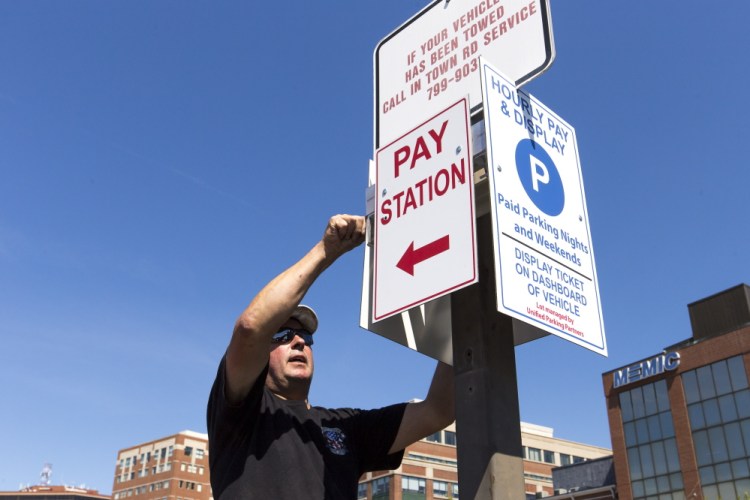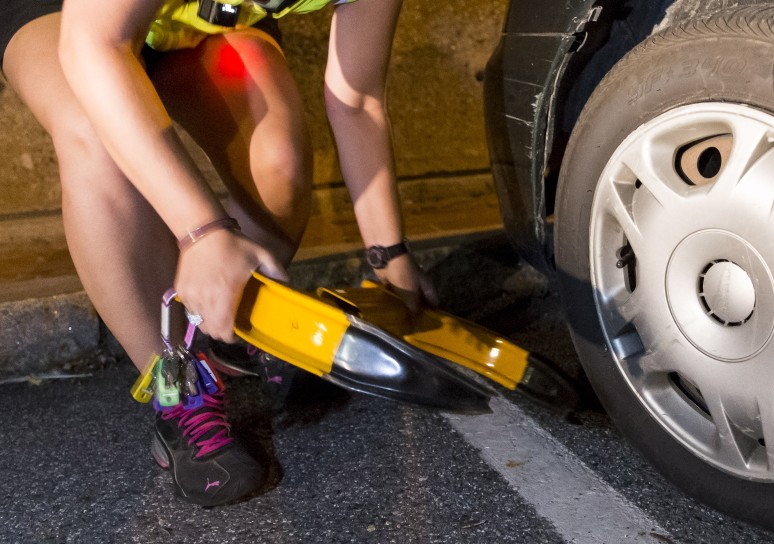An Auburn lawmaker whose car was “booted” by a private parking lot operator in Portland has proposed a new state law to require such companies to fully disclose the penalties for failing to comply with the rules.
Sen. Eric Brakey said he filed the bill Thursday, a few weeks after his car was disabled by a boot, or wheel clamp, in one of the Portland lots managed by Unified Parking Partners and he became one of a growing number of frustrated customers who say they are victims of “extortion.” Brakey was more than an hour overdue in retrieving his car and had to pay $70 to have the vehicle released.
Brakey’s bill could open the door to a broader discussion of regulation options, but for now it calls for fuller disclosure of the company’s enforcement policies with signs that spell out exactly what the overdue charges will be. The signs now say the maximum penalty is $70 but don’t say it kicks in after one hour.
“You’re booting someone’s private property without explaining the terms and conditions,” the Republican said. “If the terms are not clearly laid out, it really strikes me as a bad business practice. If they clearly lay out the terms, then it’s buyer beware.”
Meanwhile, Portland Mayor Michael Brennan said he and the city manager have asked the city attorney’s office to research the City Council’s options for further regulating the booting of vehicles in private parking lots. The city officials made that request Friday, after the Portland Press Herald published an article about the company’s business model that triggered hundreds of online comments, including additional complaints and criticisms as well as arguments in defense of the business.
LOCALS AND TOURISTS COMPLAIN
Unified Parking Partners took over the management of 16 privately owned lots downtown this summer. Many of the lots are used by office workers during the day and, because of the new business, have been opened up to the public on nights and weekends.
Unlike parking lots and garages that allow drivers to pay as they leave, Unified’s lots require drivers to estimate the amount of time they will be there, and purchase that time at a parking kiosk, which produces a ticket that is placed on the vehicle’s dashboard. When vehicles exceed their time by at least 20 minutes, Unified places a boot on the wheel. And, when customers return to get their cars, they are charged a $40 removal fee if they are less than 60 minutes late and a $70 fee if they are an hour or more late. A new cellphone app allows customers to add time if they are going to be late returning to their cars.
Locals and tourists alike have complained to the city, business groups and on social media about Unified’s aggressive enforcement, calling it predatory and unbecoming of an otherwise welcoming city. Others complain that the company’s signs and parking kiosks are too similar to the city’s, which provides free parking after 6 p.m., as well as on Sundays and holidays.
Private, pay-and-display parking lots that boot cars to enforce the rules represent a new business model for Portland, but are more common in other cities, including Chicago and Atlanta. The practice has generated complaints elsewhere, too, and led some communities to adopt regulations for companies that boot cars, such as capping fees and requiring warning signs.
Brennan applauded the company for opening up additional parking spaces downtown and being responsive to the city’s request to improve signs to distinguish the private lots from municipal lots. The city also must respect the fact that these lots are privately owned and managed, he said. Brennan said he would be open to a proposal that would cap the fee charged for removing a boot, but didn’t suggest what a cap should be.
“I think what we’d want to do is make sure we have a balance of encouraging that new parking and at the same time make people aware they’re private lots and that people are treated fairly in the process,” Brennan said.
‘A CONTRACT PROBLEM’
Unified’s owner said his company would willingly add signs that detail the enforcement policies and would not oppose efforts to further regulate the business, as long as any new regulation is consistent with regulations for towing companies.
“As long as we were left in a position to be able to fund our enforcement position,” Dan McNutt said. “We’re not interested in fighting any battles against the state. We want to comply with whatever they determine, but we want to be treated fairly as a business.”
In order for Brakey’s bill to be taken up during the next session, it would have to be deemed an emergency measure by the Legislative Council, a bipartisan panel of lawmakers that screens bills for the shorter legislative session beginning in January.
Brakey said his vehicle was booted in August, when he overstayed his prepaid time after a long wait for a table at a Congress Street restaurant.
While Unified has signs that indicate drivers could face a maximum penalty of $70 to remove the boot, it is not clear the maximum fine will be assessed for overstaying by 60 minutes. Brakey said some drivers could assume that such a hefty fee would only be levied in extreme circumstances.
“When those penalties are never clearly laid out, it strikes me as a contract problem,” he said. “How can you be held lawfully responsible for fulfilling the terms of a contract and you weren’t given the opportunity to read that contract?”
While some people have complained that the company’s enforcement agents are rude, Brakey said the person he dealt with was polite and professional, not that it helped much.
“It was still a nice guy who was extorting me for $70,” he said.
Send questions/comments to the editors.




